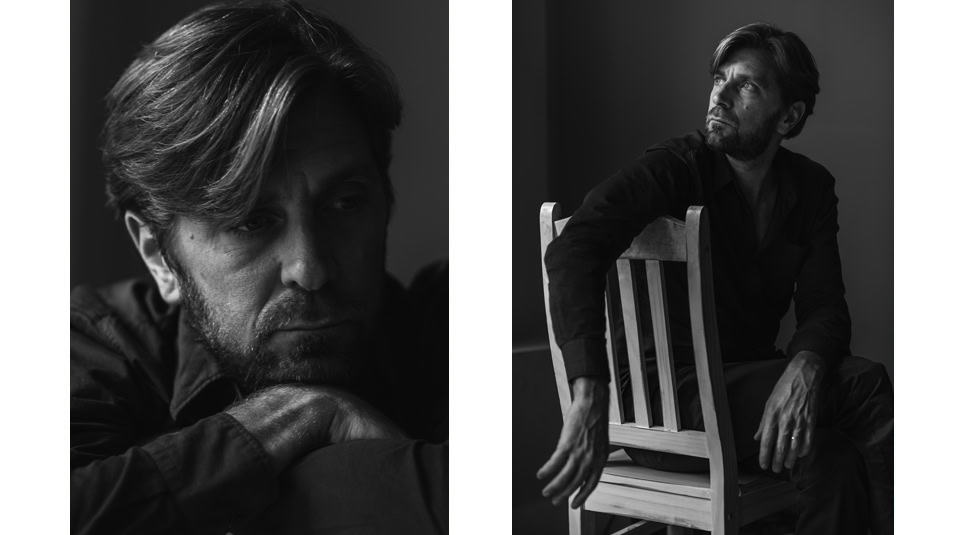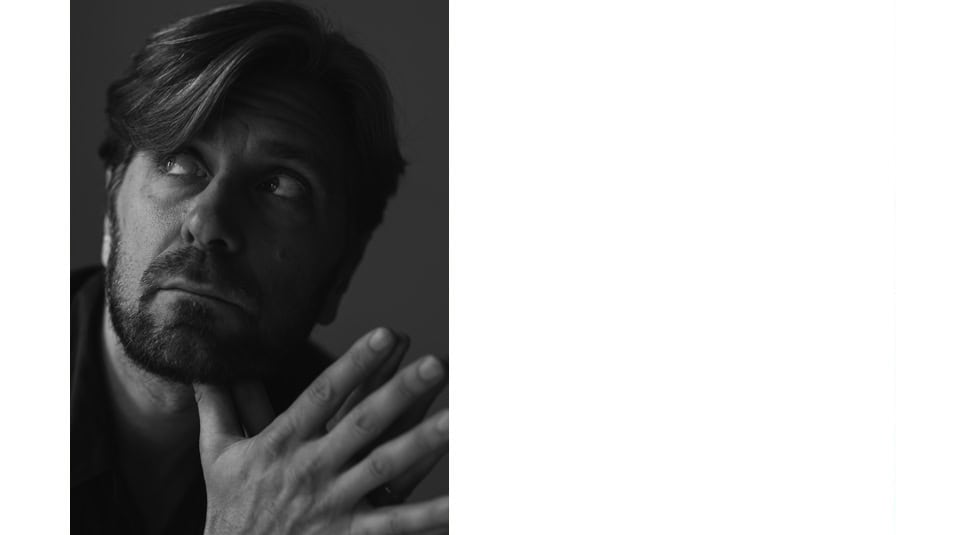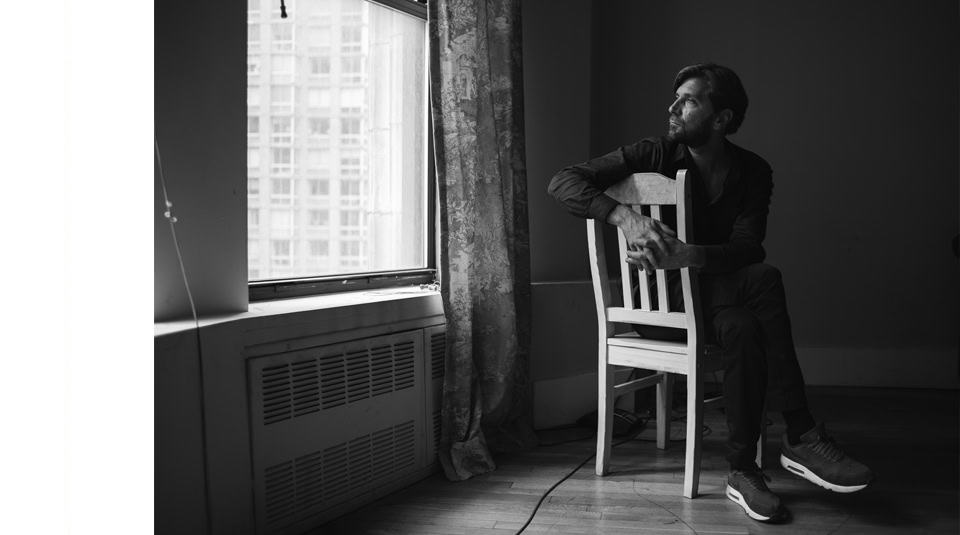When it's going bad when we're shooting, then we want to die. If the shoot is going well, we will still die.
Sweden’s Ruben Östlund picked up the Palme d’Or at the Cannes Film Festival this year for The Square, an existential battleground and lacerating potshots at the decadence of the contemporary art world. But first, what kind of a filmmaker is he? “He’s a maniac!” Johannes Bah Kuhnke told us when we sat down to chat with Östlund’s previous leading man about Force Majeure. “I think he could live on just sugar cubes because he gets so caught up in his work.” He wasn’t kidding.
The Square was born out of an art installation by the same name, conceived by Östlund and Kalle Boman—a creative advisor on the film—and exhibited in Sweden and Norway in 2014 and 2015, respectively. “The Square” is a simply lit, four-by-four meter patch of ground—literally a square—with an inscription that reads, “A sanctuary of trust and caring. Within it, we all share equal rights and obligations.” Plainly, it’s a shared space that you can enter in which passerby are required to help you in any way they can as a way of looking out for one another. It’s a symbol of basic social contract, in which Östlund is out to demonstrate that we’re fast losing that humanizing impulse.
Östlund’s film centers on Christian (Claes Bang), a squeaky-clean museum director whose world starts to unravel rather quickly. At work, he’s saddled with mounting pressure from the higher-ups to do something edgy and newfangled to court attention on social media for the aforementioned exhibition called “The Square.” A pair of marketing gurus devise a YouTube viral campaign that slips past Christian: blowing up a homeless girl who steps into “The Square” as a way to sell its compassion angle. In his personal life, our protagonist falls victim to a pickpocket scam on his way to work one morning that—far more cunning and effective than any performance art his museum has seen—delights and frightens him. Christian uses a tracking app to trace his belongings back to a low-income housing project, and in an act of desperate arrogance, targets an innocent boy that warrants a horrible blowback. Östlund continues to explode this anxiety-inducing conceit all over the place in queasily comedic ways. Christian’s post-sexual encounter with a journalist (Elisabeth Moss) spirals into a tug-of-war of words—and a literal tug-of-war involving a used condom. In another protracted, cringe-inducing scene, a Tourette’s sufferer jeers from the audience—“Suck cock! Cunt!”—during a museum talk given by a famed artist (Dominic West). And the pièce de résistance: a black-tie museum dinner goes haywire when a performance artist (Terry Notary) romps through the dining hall impersonating an ape and—well, you should watch it for yourself.
The Square opens in select theaters on October 27.
I had a chance to speak with Johannes Bah Kuhnke three years ago about Force Majeure at the Magnolia Pictures office in New York. I obviously had to ask about you, and he said, “He’s a maniac!” He had some colorful and nice things to say about your directing stamina.
[Laughs] Well, I do think I have a lot of stamina when it comes to putting the energy into the work. I can mention two things: I grew up with my mother and, as I remember it, she was constantly painting these pictures with a bird’s-eye view perspective of her hometown, Haparanda, in the far north of Sweden. She did this for hours and hours and hours. So it’s not strange to me to get caught up in your work. Also, I started my career making ski films. I think there were a hundred shooting days total, which requires a lot of stamina. Then, of course, it’s fun at the end of the day.
The social satire is strong with The Square. I understand that you set up a real exhibition first, with the purpose of investigating the trust or lack of trust that we feel for one another.
In 2008, I did this art installation, so to speak, that I prefer to call “a humanistic traffic sign.” It was during the time I made my film called Play, which was about young boys that were robbing other boys in the center of Gothenburg, where I lived. It was based on true events. These robberies took place for a long, long, long time at a mall. Even though there were a lot of adults around these kids—these really young 12-year-old kids—it was very seldom that anyone stepped in and tried to stop the robberies. It’s “the bystander effect.” Then I talked to my father about this and he told me something that also became a scene in the film. When he was little, his parents would tie a tag around his neck and send him out to the center of Stockholm to play all alone. This was in the 50s. There’s been an attitude change in society. In the 50s, we looked at other adults as people who would help our children if they ended up in trouble. Today, we almost look at other adults as people who’s threatening our children. It makes me look at how I’m bringing up my own kids because I tell them, “If you’re in trouble, talk to a woman with a child,” or a mother basically. It’s almost like teaching them to not trust other adults. That’s kind of strange because, actually, society has become safer since the 50s. So it’s paranoia that has increased. For me, that was the connection between the robberies that happened, and how kids and adults were existing on two parallel levels. They were not in connection with each other. In this context, me and a friend of mine [Kalle Boman] came up with the idea to create a symbolic place where we’re reminded of our goal as fellow human beings. We wanted to create a new social contract. We wanted to create “a humanistic traffic sign” that reminds us that we can give responsibility or take responsibility. So that was the starting point. After Force Majeure, I was invited to do an art exhibition about it. Now “The Square” exists in two cities in Sweden and two cities in Norway.
We’re constantly reminded of ourselves watching the film, as well as “the bystander effect.” We see a crowd of people ignoring a woman’s plea for help, which is echoed when museum patrons turn a blind eye to assaults during a performance art piece. Beggars are ignored—constantly. Where do you think the state of our social contract will be in the future?
Well, if we’re talking about Swedish society, you could say that we still trust each other to a large degree. We put a lot of trust in each other and a lot of trust in the State, also. But if you look at the statistics, it’s been going down a little bit since 2005. So it’s not a big difference, but the thing is that, when I talked to this sociology professor, he said that you can compare trust in society with the coral reefs. It can do quite the damage. There’s a tipping point when the consequences will be catastrophic. It’s something where, in order to maintain trust in society, it’s an on-going struggle. I think that’s a problem for us because, when we have this capitalistic system, it’s much better to have people who don’t trust each other. We’ll consume more. We’re better consumers if we’re scared. It’s not meant to sound insidious—it’s just part of the economic system.
I took a look at your Q&A from this year’s New York Film Festival and it was interesting to hear you say that you were aiming to premiere this movie at Cannes. It makes sense because it is such a ripe opportunity in which to hold up a mirror to these tuxedos in this elitist setting that totally echoes the museum and patrons in the film. Does that influence the film as well?
That was fantastic, of course. I think it’s important for me when I’m doing a scene that I’m actually aiming somewhere because, if I don’t know where I’m aiming, it doesn’t matter how hard I try to control the bull, you know? For me, it’s helpful to say, “We’re going to make a movie that will be considered to be in the official competition at Cannes,” because everybody in the scene understands what we’re going for. That can also intrigue the performers. So the goal with that is to elevate the performances and try to make the scene better. I’m thinking exactly in the same way as the PR agency does in the film: “What do we need to get attention for this content that I think is important? How should we do that?” Well, Cannes is a very good arena.
Congratulations on the Palme d’Or—the pinnacle of achievement for an auteur. Without being modest, do you breathe a sigh of relief? It is the mark of validation beyond all measure.
Of course, it makes you happy. I have a friend who’s an author and he described it quite well a couple of years ago when he became very successful: “Every time you climb to the next level, you think that this is going to be where you find the knowledge, the quality, and the prestige. But as soon as you get there, you realize that it wasn’t there.” [Laughs] And it’s the same thing when you climb to the next level and the next level. Don’t get me wrong at all, it is a great privilege to win the award, but you also realize that you entered to compete in the section yourself. If I look at the track record when it comes to the Palme d’Or, then I feel humbled. These directors have done a lot of things and I remember almost every one of them. So that humbles me. It doesn’t make me feel nervous or anything. I feel confident with the experiences from my five films. I hope that it won’t affect me in a bad way. I don’t think it will.
Since we’re on the topic of Cannes, what was your experience like being on the other side of this when you served on the Un Certain Regard jury in 2016? What did you learn from that?
It was two completely different things, of course. The biggest difference is that you can just be there and enjoy it and you don’t have to perform. You’re not nervous about your film that will screen. Sitting on the jury, they treat you in a very nice way. It was for me the best possible kick-off for starting the shooting of The Square because I was looking at so many feature films in a very concentrated way, with an audience in Cannes when I’m aiming for that room—when I’m aiming exactly for that arena. I got to know a lot about the audience and about the mechanisms of screening a film there. So I think it was very helpful for me.
Your comedy is razor-sharp. For instance, after Christian gets his phone stolen, his superior asks him, “Was that your work phone?” Her line of questioning tells you exactly who she is and what her preoccupations are. Does it come easy to you? How do you approach comedy?
Well, all of the scenes in the film are things I experienced myself or things my friends have told me about. I think I work like stand-up comedians: I pick up material from what happens to me in my everyday life. I was actually having dinner with Larry David when I was in L.A. a month ago and he was there with a couple of his comedian colleagues. It was fun because they were telling stories around this table and it was obvious that they were trying out material. I felt a connection because that’s what I do. I love to talk about the next film that I’m doing because it’s also a way for me to know how I should do it, elevate the idea, and try to make it better.
Now I’m dying to know more about your next film. Is the idea concrete?
Yes. So my wife is a fashion photographer and she told me so many interesting stories about the fashion industry, the beauty industry, and the modeling industry. The title is Triangle of Sadness, which is the wrinkle you get between your eyebrows because you had a lot of trouble in your life. But don’t worry! You can fix that in sixty seconds with botox. [Laughs] It’s so interesting to look at beauty as an economic value. If you’re born beautiful—even if you don’t have education, money, or talent—it’s actually a value that can let you travel and allow you to become a part of another hierarchy in society. It’s almost like a lottery that anyone can win. Then you try to monetize your looks. It’s a very short period before you have to try to find an exit plan. So I’m going to look at these themes with a male model who’s with a career, but he has a problem—he’s going bald.
When you’re at this stage, do you already have a list of actors that you’re considering?
I do write down a list of people that I’m interested in that could be a possible actor for the film. I’m quite happy with the ensemble for The Square. I think the casting director did a beautiful job. But the only way to reach that is to try out a lot of actors—a lot of people. Actually, you can never give a part away when you’re working like that because you can find something that’s unexpected and so much better than the famous actors out there. It’s going to be a long casting process.
I’ve heard you talk about “building the culture of cinema” before. Could you elaborate?
I can feel it all over the world when I’m traveling: how the film industry has lost a little bit of self-esteem. It’s when the film industry says, “We need to make better films.” They’re hoping to create hits that will bring back the audience to the cinema. I don’t believe it in that way. I think it’s the culture of cinema that has to be built up. And in order to build up the culture of cinema, we have to introduce a new generation into the cinema and make that an experience that you can actually enjoy and an experience that’s meaningful. If you look at soccer, for example, before they started to screen soccer on TV in Sweden, almost no one went to the live games. So I don’t think screening films on TV or Livestream or things like that is decreasing the amount of audiences in cinema. We really, really need to create an event where we go to the cinema, and not only in the big cities, but also on the countryside. What we did with The Square is, we went on this Golden Pond tour that was inspired by what the NHL hockey teams are doing with The Stanley Cup trophy. They take that trophy to their home cities. So we went to ten different cities where the crew working on the film lived. We’re trying to recruit a new generation, but we also need to recruit a new generation that have talent and will make cinema interesting. I think the strongest reason that makes cinema interesting is how we’re sitting in one room and watching the images together. Do you know what the only thing that people watch together in the homes of Sweden is now?
What is that?
It’s the Eurovision Song Contest—a stupid, silly song contest. That’s basically the only thing that families are looking at together. Otherwise, they’re looking at their own platforms. So cinema is a good way to look at something together and create discussions about what we have seen.
I have no idea how we circled back to this: Johannes was on a singing competition.
Yes, yes, he was! [Laughs] That’s true. Both Johannes and Claes were on some TV show in their track record. I think Claes was on So You Think You Can Dance or something like that.
Is that a point of intrigue to you? You’re sort of flipping their image with your art films.
Not at all. Claes was not known in Scandinavia at all. So for him, this was a breakthrough role at 50 years old. Maybe I do like having him make a name for himself coming into it as an unknown.
Do you still get surprised when you make movies?
Well, I feel like a complete beginner every time. It never gets easier to make movies and that’s probably the biggest surprise. You hope that you have some more knowledge and skills, but you’re also demanding a little bit better performance from yourself. Sometimes that feels stimulating: “What a great feeling to be challenged!” Sometimes it’s tiring: “Will it always be such a struggle?”
If it felt easy, maybe there’s something wrong?
Exactly. You’re constantly worried about this, also. If you manage to shoot something in one day, it’s like, “Huh.” [Laughs] Then you’re skeptical like, “There’s something missing here.” We have a ton of dark humor when we’re shooting, you know? Every time you drive onto set, we’ll be putting on our seat belts and describe it this way: When it’s going bad when we’re shooting, then we want to die. If the shoot is going well, we will still die. It’s an emotional rollercoaster—all the time.




 A Conversation with Sean Wang
A Conversation with Sean Wang A Conversation with James Paxton
A Conversation with James Paxton
No Comments